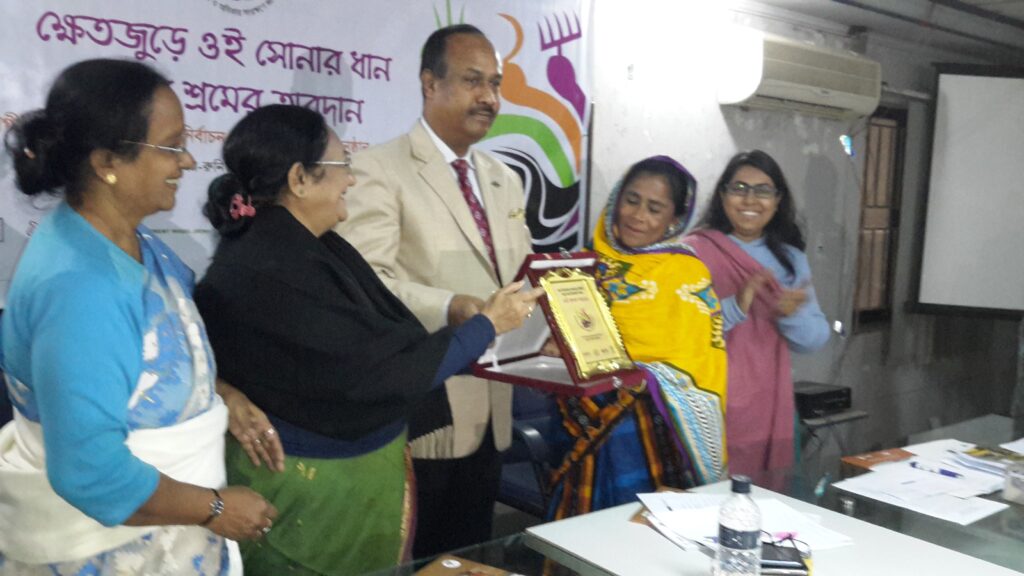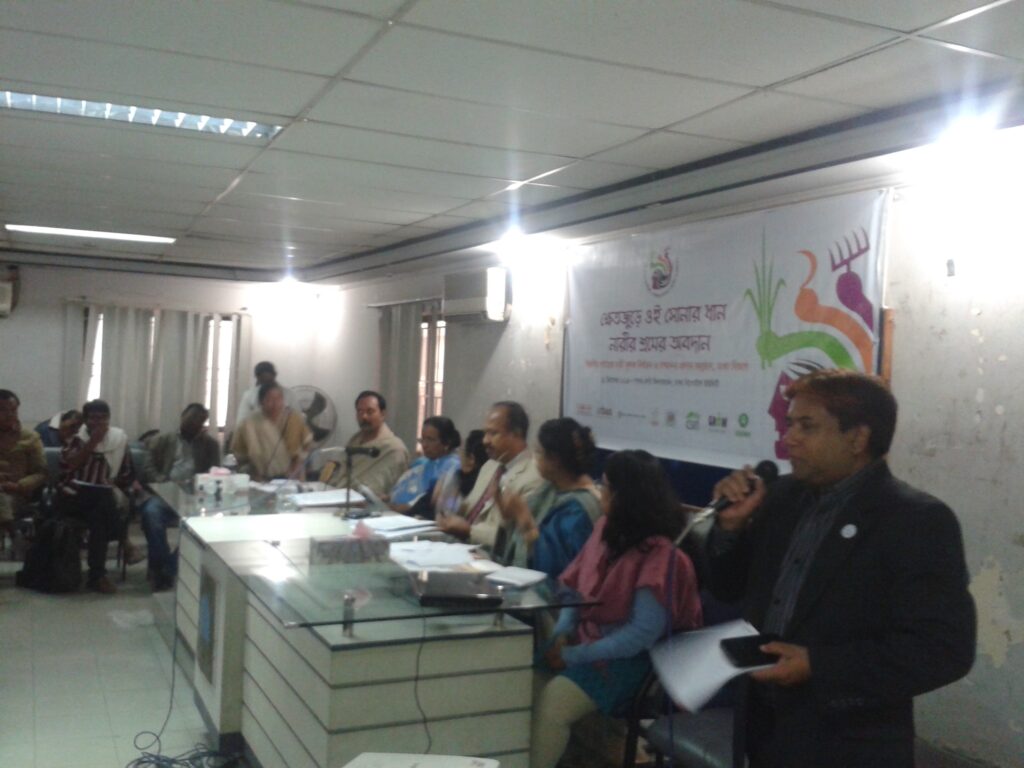Development Wheel has been implemented Agricultural Rights Project with the support of Swallows India Bangladesh since 2011 to 2019 in the Mymensingh Sadar and Gouripur upazila;
Objectives
Overall objective: Reduced poverty and more sustainable livelihoods amongst poor and marginalised communities in northern Bangladesh
Poverty alleviation remains the single biggest challenge for Bangladesh. International and national bodies have set specific targets and strategies to reduce poverty and income inequality as part of the Millennium Development Goals (MDG)s. Poverty alleviation and improvement of livelihoods is also reinforced in Bangladesh’s National Strategy for Accelerated Poverty Reduction (i.e. PRSP II).
Specific objective: Effective participation of poor and marginal farmers in Mymensingh in decision-making processes so they can attain their rights from public and private stakeholders and improve their income from agriculture
2.2 A detailed presentation and analysis of the problems and their interrelation at all levels:
Agriculture is the most important sector in Bangladesh, accounting for about 21% of GDP and about 50% of employment (Bangladesh Bureau of Statistics, 2008). However agriculture could contribute more to the economy and to ensuring more equitable distribution of wealth if the sector did not face numerous challenges (disorganized, poor and marginal farmers; fragmented farmland; scarce water resources; soil degradation; unpredictable climate; inadequate agricultural infrastructure; lack of diversified agriculture; inadequate and inefficient finance systems; inadequate extension services etc.)
In Bangladesh, the agriculture sector is made up of millions of poor and marginal farmers; 76% of farming households operate with less than one hectare of land (Department of Agriculture Extension 2006), of which 40% are almost landless (below 0.02 hectares) or marginal (0.02 - 0.2 hectares). This 76% of households account for just 4% of cultivated land. They therefore depend on additional income gained from leasing land, share-cropping and selling agricultural labour. Small and marginal farmers face discrimination in accessing government services including fertilizer distribution, soil testing, production training, agricultural subsidies and loans, production advice, registration etc. The challenges facing small and marginal farmers are compounded by their size - they get low quality inputs and low prices, and they incur higher costs of transportation, rental of equipment, machines and storage. They also lack the volumes and capacity to bargain with market actors for better prices. As a result small and marginal farmers and their families remain poor.
Given the number of small and marginal farmers who rely on the agriculture sector for their livelihoods, it is essential to improve agricultural governance and productivity. This can only be done effectively by organizing small and marginal farmers into strong organizations (NSAs) so they can utilize their collective power to voice, negotiate and attain their rights, services and due shares from other stakeholders (public and private service providers, local authorities and other value-chain actors) and to utilize economies of scale in buying and selling. At the same time, work needs to be done with these other stakeholders to raise their awareness and build their capacity to address the issues of this excluded farmer community
2.3 A detailed description of the target groups and final beneficiaries and estimated number:
The main target group and the final beneficiaries are 1600 small and marginal farmers (with less than 0.2 hectares of land) and their families in Mymensingh. With average family size of 4.7, total number of beneficiaries will be 7520 poor people. Per capita GDP in Mymensingh is US$ 614, much lower than the national average of US$ 690 (2009). The main reasons for selecting the target district are: large numbers of poor and marginal people; a diversified mix of economy and livelihoods; a growing demand for business and extension services; and the potential for significant and measurable impact.
Other target groups include:
2.4 The specific problems to be addressed and the perceived needs/constraints of the target groups: This project will address the following problems facing small and marginal farmers:
2.5 How the action will provide the desired solutions
The target farmers are small and marginal (less than 0.2 hectares) and are in dire need of services, support, inputs and market access to help them increase their income and develop sustainable livelihoods. This project will organize farmers into groups and associations and train them to demand, negotiate and realise their rights and services. This will enable them to:
2.6 Background information that led to the formulation of the action
This project is based on the learning and success of our Sustainable Livelihoods for Poor Producers (SLIPP) project (EC contract no: ONG-PVD/2006/118/777), in which DEW is the main co-implementing partner of Traidcraft Exchange (TX). SLIPP is now in its fifth year. Results already achieved include:
SLIPP has proved that this model of organizing and empowering poor farmers is effective. Over the last couple of years the project has gained momentum. There has been a strong demonstration effect as producers from neighbouring villages (who were not part of the SLIPP project) have seen the benefits of the project and have demanded their inclusion in project activities. However SLIPP has also helped us realize that farmers face a variety of other needs including agricultural governance (which SLIPP is not addressing). These include poor agricultural governance and inadequate access to agricultural infrastructure and equipment. To address these issues associations capacity needs to further strengthen
The project will take the learning and achievements from SLIPP and scale up this successful model (with more focus on agricultural governance) to reach a far greater number of farmers through their associations thereby broadening the scope and scaling up the impact. So initially project will work with associations to further improve their capacity. Afterwards they will increase their outreach and support the farmers for both economic and social empowerment.
2.7 Expected results:
The expected results and outputs of the proposed projects are, as follows:
Result 1: Target farmers are working collectively and collaboratively
The project will work with 1600 farmers into 64 local Self Help Groups (SHGs), and two district level associations. These organizations will then be trained so they can operate effectively (e.g. holding regular group meetings, sharing learning, taking collective actions - buying/selling products, demanding and accessing services, saving and investing). Although Bangladesh is an agro-based country, many farmers lack adequate agriculture infrastructure. Consequently farmers have to hire infrastructure facilities at high costs making their products more expensive. Organizing farmers into groups will help them to collectively purchase, run and maintain agricultural infrastructural facilities and equipment. The project will ensure the following direct benefits:
Result 2: Government and private sector stakeholders recognize the needs of target farmers and reflect these in the development of policies and practices
This activity is core to this project. The project will raise awareness amongst public and private sector bodies and local authorities of the problems facing small and marginal farmers. At the same time it will organize dispersed and almost invisible poor farmers into a visible social force who can, through collective action, solve many of their problems related to services, rights and infrastructure.The project willbuild the capacity of farmer organizations (especially the district associations) to engage in dialogue with public and private sector stakeholders and negotiate more supportive policies and increased resources and support. The project will also build the capacity of public and private service providers to develop and provide appropriate and affordable agricultural services to small farmers. The project will ensure the following direct benefits:
Result 3: Target farmers have improved their production practices and market access
Poor and marginal farmers face multiple problems including low yields, high costs, low prices, crop failure and distress sales. Our SLIPP project has shown us that the main reasons for this are lack of appropriate and high quality information, services and inputs. Associations will build linkages between service providers and farmer SHGs to ensure that farmers can access appropriate and affordable agricultural services. Providing services through farmer SHGs will ensure more efficient and cost-effective service delivery. By providing farmers with vital services this will help them to improve cultivation practices, increase productivity, reduce costs and improve quality. The project will ensure the following direct benefits:
Empowering women: Runa awarded by the Minister as a best women farmer
Women Farmer's Campaign in Bangladesh: Development Wheel (DEW) as a member of CSRL, OXFAM GB carries out a campaign focusing on women farmers’ contribution and recognition in Food Security of Bangladesh. The focused areas of the campaign would be a new venture for promoting women farmer’s rights through engagement of wider population of the country. The initiative will provide rural women farmers a platform to showcase their achievements in feeding their family on limited land and the influence of climate change.
This campaign is being organized to raise mass awareness about women’s contribution made to the national and household level food security, to celebrate and recognize women’s contribution in household and national level and mobilize public opinion towards the recognition of women farmers’ contribution and need for policy measurers to promote women’ rights as farmers. After completion of the campaign, 7 female farmers from 7 divisions will be awarded through a national level ceremony. As a role model, those champions would act as the ambassadors for promoting rural small holders women’s rights.
Runa Akhtar one of our ARP project participants living in the Char Anandipur, Mymensingh; based on achievement in contribution made to the household food security recently Runa has been selected by the panel of judges as one of the best women farmer under Women Farmer Campaign in Dhaka Division of Bangladesh. She has been awarded by the State Minister of Labor and Employment Mr. Mujibul Haque in a divisional level award giving and listening of their struggle and success story event at the Reporters Unity. The event was chaired by Ms Shirin Akhter MP, Champaign Manager of Oxfam Ms. Monisha Biswas, Judges pannel members, civil society organizations and huge print and electronic media ware present in the occasion. As a role model now Runa would act as the ambassador for promoting rural small holders women’s rights.

Runa is receiving award from the state minister, Ministry of Labor & Employment and Shirin Akhtar MP

Mr. Shah Abdus salam, ED, DEW is delivering his speech in the occasion
 |  |
Runa Akhter with her family members
